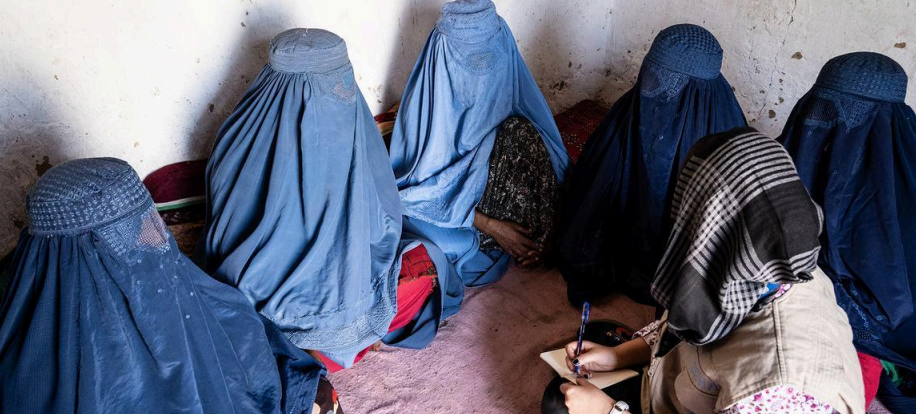- info@ghrd.org
- Mon-Fri: 10.00am - 06:00pm
46th UPR Session: Fourth Cycle of Afghanistan

46th UPR Session: Fourth Cycle of Afghanistan
29-04-2024
Written by Elena Vallejo Secadas (UN Team)
Global Human Rights Defence
The Interactive Dialogue on the 4th cycle of the Universal Periodic Review of Afghanistan was held on April 29th in Geneva, where the national report and the summary of stakeholder’s information were presented.
It should be noted that this review is highly unusual because the representatives present are authorities of the legal government of Afghanistan and not of the de facto government that came to power through a coup d’état perpetrated by the Taliban in August 2021. Due to this anomalous situation, little remains of the measures carried out
by the previous government aimed at complying with some of the recommendations
gathered in the third cycle of the UPR held in 2019 and that, despite being included in the national report, most of these measures have been dismantled, repealed or
suspended.
Due to this situation, and despite the fact that the format of the review has not changed,
the dynamics have changed, as we are not faced with a state government defending its human rights measures and progress, but with legal representatives out of power
criticizing the deplorable human rights situation after the coup d’état. The national delegation shows its support, respect and appreciation for the mechanisms of the Human
Rights Council, in particular the UPR, and for this reason, despite their request to postpone the review, they present their report and emphasize that they will continue to work even from exile to achieve an egalitarian society that respects human rights.
Afghanistan’s ambassador to the United Nations in Geneva was in charge, together with
other representatives, of presenting the national report. The report highlights the deterioration of the human rights situation, especially with regard to women and girls, and the refusal of the Taliban government to recognize and thus comply with the international human rights treaties and conventions signed and ratified by Afghanistan, whose prerogatives should be included in national legislation.
In their presentation, the various representatives of the country were alarmed by the situation of women and girls who, under the Taliban yoke, are isolated in a society in which they exist but do not live, since they are not active elements in public life. They point out that this is the most backward country in the world in terms of gender equality, more so than any other Islamic nation. They criticize that the Taliban claim that they are respecting human rights according to the Sharia and that they have changed the Ministry of Women’s Affairs to the Ministry of Preventing Vice.
They also highlight the situation of defenselessness faced by different ethnic and religious minorities. The non-existent freedom of expression that puts journalists, independent media, human rights defenders and political dissidents at risk. They also highlight the elimination of all measures against torture and the reforms that had been carried out in the penitentiary system, where authorities operate without transparency or accountability in the face of numerous cases of torture and physical and sexual abuse.
Regarding the situation of children’s rights, restrictions on education and health have been implemented, and the sale of children, forced marriages, trafficking and sexual violence have proliferated. The lack of resources and protection also affects the increase in food insecurity. This situation is aggravated with respect to people with disabilities, who have been deprived of any specialized care.
As for the justice system, they denounce that the Taliban have dismantled the entire judicial structure, favoring total impunity. They have created their own courts, with completely arbitrary operations and composed of members who are mostly included in international sanctions lists and have little or no legal knowledge, submitting their decisions to a fundamentalist interpretation of the Sharia, where corporal punishment and public executions are included. They denounce the repeal of the penal code and other national laws and the non-compliance with international treaties. They also denounce reprisals against former members of the administration of justice, who have been imprisoned and impunity and release of like-minded terrorists. They have eliminated the office for the review of death sentences and have included penalties of public execution by stoning and flogging for crimes such as theft or adultery.
As for counter-terrorism measures, the Taliban do not respect the commitments contained in the International Convention for the Suppression of the Financing of Terrorism, with strong links between them and other terrorist groups and drug trafficking.
They are alarmed about the situation of Afghan refugees in countries such as Pakistan, Iran or Turkey who are being repatriated and forced to return to their homeland with all the danger that this entails. They call for an end to these situations and for Afghan refugees and asylum seekers to be allowed safe travel routes and visas to leave the country if they wish to do so. They express their gratitude to Sweden, Denmark, Finland and Switzerland for allowing women and girls to apply for asylum simply because they are women and girls and call on other countries to take action in this regard.
They urge the international community and the United Nations to create an independent
mechanism to monitor, gather evidence, prosecute and promote accountability of a regime that constantly violates human rights, fundamental freedoms and human decency. They also aim to ensure that the crime of gender apartheid is considered a crime against humanity and can be prosecuted by the International Criminal Court. They consider it vital to be able to prosecute these situations according to universal justice and to make them imprescriptible.
They call on the international community to continue to monitor the human rights situation in Afghanistan and to make any collaboration with the Taliban conditional on respect for human rights and compliance with international conventions and treaties. They pledge to continue to work for a democratic government that complies with the rule of law.
As for the recommendations from the member states, most of them mentioned the importance of the de facto government to respect the conventions signed and ratified by Afghanistan in the past and to implement a moratorium on the death penalty so that public executions and corporal punishment cease.
Likewise, most of the delegations in their interventions highlighted the terrible situation in which women and girls find themselves, the elimination of their rights to participate in public life and their restrictions on education and the extreme vulnerability in which they find themselves in the face of trafficking and child and/or forced marriage. They demanded that the de facto government take measures to advance equality, allowing women access to employment, education, freedom of expression and transit. They also mentioned the discrimination faced by minorities such as the Hazaras, LGBT people and people with disabilities.
Some representatives also recommended to the government the reopening of the Independent National Commission on Human Rights, closed after the coup d’état, and its collaboration with the Office of the United Nations High Commissioner for Human Rights. They also asked the government to take measures to intensify the fight against terrorism, which affects internal security as well as the security of the entire region.
They also call on the government to allocate resources to ensure access to water, sanitation, food security and access to health services.
Sources and further readings:
(2023) UN News: Afghanistan: UN forced to make ‘appalling choice’ following ban on women nationals. Available at:
https://news.un.org/en/story/2023/04/1135512 (Accessed: 2nd May 2024)
Afghanistan National Report 4th Cycle UPR. Available at :
https://www.ohchr.org/sites/default/files/documents/hrbodies/upr/sessions/session46/af/a-hrc-wg-6-46-afg-1-av-afghanistan-e.docx (Accessed: 2nd May 2024)
Compilation of UN information. Available at:
https://undocs.org/en/A/HRC/WG.6/46/AFG/2 (Accessed: 2nd May 2024)
Summary of stakeholder’s information. Available at: https://undocs.org/en/A/HRC/WG.6/46/AFG/3
(Accessed: 2
nd May 2024)
Search
ABOUT US
Global Human Rights Defence (GHRD) is a dedicated advocate for human rights worldwide. Based in The Hague, the city of peace and justice. We work tirelessly to promote and protect the fundamental rights of individuals and communities. Our mission is to create a more just and equitable world, where every person's dignity and freedoms are upheld. Join us in our journey towards a brighter future for all.
ALL CONTACTS
-
Riviervismarkt 5-unit 2.07
2513 AM The Hague - Phone +31 62 72 41006
- info@ghrd.org
-
Mon-Fri: 10:00am - 06:00pm
Saturday & Sunday Closed - Bank Details: NL69 ABNA 0417 9430 24
- Chambers of commerce NR. 27261631
SUBSCRIBE
Stay informed and be part of change - Subscribe to our newsletter today!
- Copyright of ghrd 2023. Powered by Desmantle Studio.


Leave a Reply